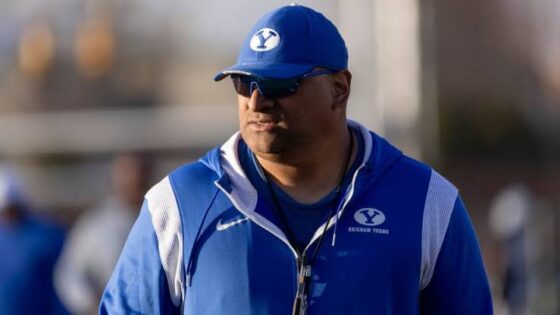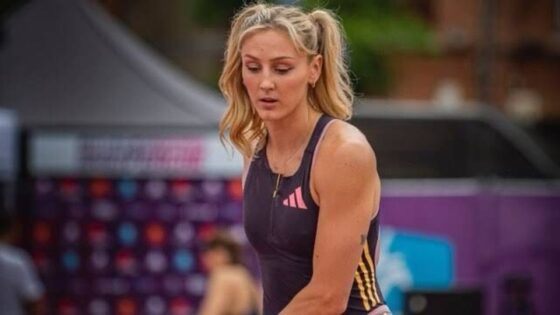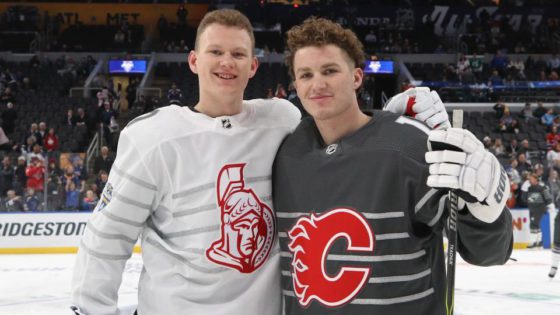At 6-foot-8 and 315 pounds, the new addition to Kalani Sitake’s offensive line already looks like he belongs on an NFL depth chart. But off the field, he acts more like a leader than a tough guy. In his local Latter-day Saints Young Single Adult ward, he’s a dedicated member, balancing his football rehab with scripture study. While his commitment to BYU’s program is evident, so is the subtext of a cultural reset.
The BYU Cougars snagged a former top Michigan lineman out of the portal last cycle. What’s fascinating isn’t just who BYU landed, but why a player that good left the 2023 national champs. The answer lies with Andrew Gentry, once a prized Jim Harbaugh-era recruit and former #75 RT for Michigan.
Andrew Gentry appeared on BYUtv’s Sports Nation and opened up about the stark differences in strength and conditioning philosophies between Ann Arbor and Provo. “At Michigan, you bring guys in, you’re bringing in a lot of four- and five-star guys, and so at the end of the day, a little bit more developed maybe and ready to go,” Gentry said. “Honestly, at Michigan, maybe not quite as hard as the conditioning’s been here. I’ve kinda seen both aspects. There’s a lot of functionality-type movements at Michigan, and here it’s a lot more—you’re going to grind, it’s going to be a little bit harder, which I’ve loved having both aspects.” He wasn’t being critical, just honest. Michigan uses functional training. BYU leans into old-school grind, but it’s backed by data and injury prevention.
That’s the part Andrew Gentry emphasized: both systems work. “But here [BYU] they do it really smart, too. I mean, they’re going to train you hard, but they’re going to make sure they’re doing it science-based, and they track everything and make sure we’re not getting injured,” he said.
The contrast Gentry paints is a reflection of how two elite programs develop talent through different philosophical lenses. At UM, the assumption is that high blue-chip talent accelerates the learning curve. At BYU, there’s a bit more boot camp, and the payoff is toughness layered with precision. For Gentry, who’s lived in both cultures, the duality has value: “It’s been really cool to kind of see both aspects of ways that work.”
The challenge now for Kalani Sitake’s strength and conditioning team is to get their big #75 RS-Junior healthy. Andrew Gentry played two games for Michigan in 2024, but a season-ending injury against Michigan State derailed what was supposed to be his breakout. He finished with the team’s highest offensive line grade and didn’t allow a single pressure over 115 snaps. BYU’s staff knows what kind of asset they’ve got, but his timeline remains cloudy. “I’ll miss a little bit of spring ball and different things like that. So for me, the plan right now is to get healthy as fast as I can, get rehabbed, get 100%, and then I’ll be playing tackle, hopefully,” Gentry said earlier this year.
What stands out in Gentry’s approach for Kalani Sitake isn’t just optimism—it’s the humility. “It’s just going in there and competing, really, and that’s what I told coaches. I’m not in this to ask for a guaranteed starting spot or anything like that,” he said. “I know that’s earned, and there’s a lot of guys that have put blood, sweat, and tears into this program, and so I’m going to put that blood, sweat, and tears right with them and earn my spot.” For a former blue-chip with national championship pedigree (and a title), that kind of attitude resonates deeply at BYU.
Now, months into his rehab, the tone remains upbeat. “It’s going awesome. It’s fantastic. I love the way that people are working. I love what Coach [Ryan] Phillis has in store for us, what he’s been doing in the weight room with us,” Gentry said. “There’s high expectations going in, which is what we love. It’s been amazing, though, so far. I’ve loved it. Rehab’s going super well. Just excited to get the pads on and get going in the season.” Such dedication and positive outlook are precisely why his journey fits right in at BYU.
Andrew Gentry’s comeback path feels tailor-made for Kalani Sitake’s culture
Andrew Gentry’s not just BYU’s biggest offseason addition—he might be the most on-brand too. The 315-pound tackle, who left Michigan for Provo, already checks every cultural box Kalani Sitake could ask for. And while he hasn’t played a snap for the Cougars yet, he’s already a full-fledged fit in the locker room and in the chapel.
Gentry revealed earlier this year that the foot injury he suffered last season at Michigan was a Lisfranc. A notoriously tricky recovery for linemen. He’s been on the mend ever since, though he’s inching closer. “So hopefully in a week, [I] get out of the boot, and then I can start walking around like a normal person,” Gentry said of his protective boot a few months ago. As for when he’ll be medically cleared, he noted, “Not 100% sure yet. We’re looking sometime in April, May-ish right now… really just trying to do as fast as we can to get back and healthy and ready to go for the season.”
Now, with just a couple of months until kickoff, he seems good to go and is expected to be in a prime position to win a starting tackle job. His favorite BYU trait, however? Culture.
It’s not just the culture; a strong family connection to BYU runs deep for Gentry. His grandfather, Lowell Madsen, played on the offensive line for BYU in the 1950s. His father, Todd Gentry, played basketball there, and his brother, J.T., also played football for the Cougars, as did his uncle, Michael Madsen. “It’s almost like a homecoming of sorts,” Gentry added. Now, he’s already doing all the classic ‘Y-guy’ stuff around Provo.
The post Kalani Sitake’s BYU Transfer Exposes Stark Cultural Divide From Sherrone Moore’s Michigan appeared first on EssentiallySports.



